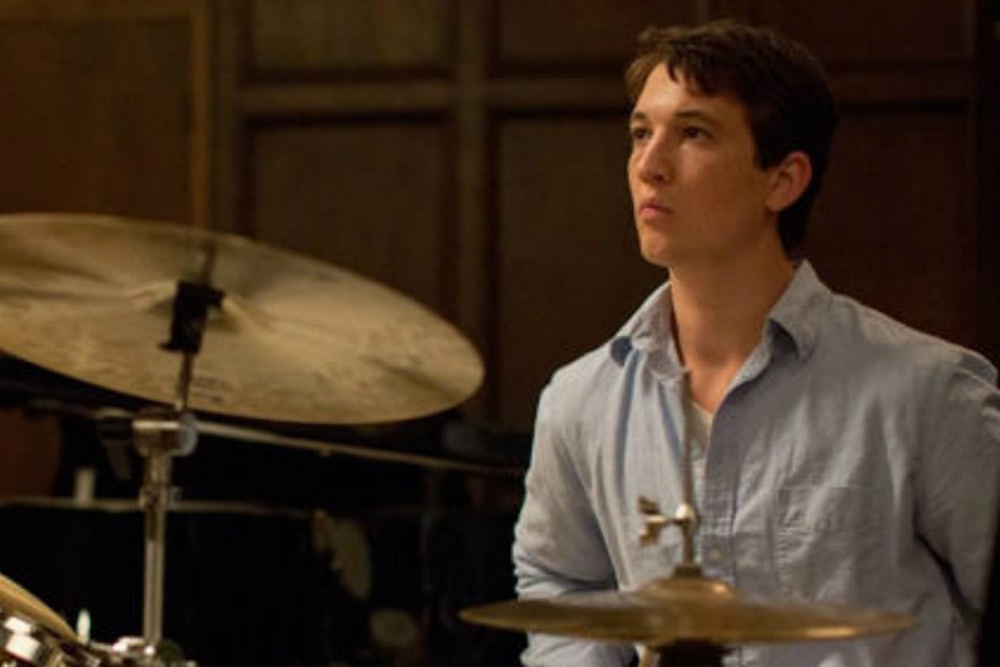Whiplash is the first feature film by a 29-year-old, Damien Chazelle, and it’s an old-fashioned, roller-coaster, cutting contest of a movie, unafraid of clichés, humbug, and ham, but driving forward and demanding our attention. It has plenty of blood and sweat, but make no mistake, testosterone is what it’s made of. There’s a poignant moment when its hero tells an appealing young woman (Melissa Benoist) to quit his life, because it’s success, glory, and solos he’s after. A lot of guys are going to go wild for this policy. There’s only one drawback—it’s about a drummer!
This is part of a hallowed tradition in movies: It’s the drill sergeant and the raw recruit, as in An Officer and a Gentleman; it’s Denzel Washington and Ethan Hawke in Training Day. In this case, it’s life at what is said to be the best jazz school in the country. Andrew Neiman (Miles Teller) is a beginner who lives with his Dad. He knows he’s a nerd, but he has sticks for hands. He wants to drum. Thus he meets Terence Fletcher (J.K. Simmons), the ferocious teacher who has led the school band to many prizes. Teller does a very decent job and apparently did a lot of the drumming himself. He may go far.
But this Fletcher has been far already. A lot of us are going to be happy to see Simmons getting his due in this part. On television, he’s been in The Closer, Oz, and Law and Order. He seems to be in about a quarter of the movies ever made. And for several years he has been the daft boss in Farmers insurance commercials. As Fletcher he is paper thin, bald, dressed in black (fascist chic), with veins standing out when he breathes. Fletcher is an appalling human being—cruel, self-pitying, a liar—and a teacher that any school should dismiss. But Whiplash is happy with the idea that these faults only make him an essential teacher of real genius. On the other hand, Fletcher does admit that he’s never encountered a real genius in all his years of teaching—though he has put some students in hospital, in the grave, and in misery. Genius is actually beyond teaching or example. It doesn’t bother with or heed advice to practice 25 hours a day or suggestions to give up on sex, golf, and other addictions.

There’s good sense in telling students to work hard and practice, practice, practice. But it’s mainly what makes teachers feel useful. You can’t really tell young people: be talented, be a genius, be better than others. I know, this is close to un-American—saying some people really are born better or different. But it’s true. Fletcher tells a story several times (many things in Whiplash are repeated), that the young Charlie Parker was so off in his playing one day that the drummer Jo Jones threw a cymbal at him. So Parker went away in tears, studied, and came back to be “Bird.” I’m sure there’s a seed of truth in the story, but don’t think that Bird ever showed the least sign of professional dedication, career reliability, or being on time. Parker died at 34 in a body that the coroner reckoned must be 20 years older.
On the other hand, Simmons makes the detestable Fletcher a riveting act, with his foul mouth and lack of interest in the music. He talks about the beat, but he wants to beat people down. He rants about pace and rhythm, but these are all ways to goad and humiliate Andrew. He never has a band that is allowed to take delight in music.
That’s where drumming comes in. Yes, it’s cinematic; it allows a kind of physical performance that commands the camera; and it gets inside you. But anyone who has spent a life following jazz is ready to flinch from the vulgarity and the adolescent me-me-me of obtrusive drumming. Whiplash is a tirade and a cataract of drum solos that take as long as it took Roger Bannister to run a mile. There are times when Andrew’s other musicians fall silent in horror and shame for their fellow. A band needs a drummer, to be sure, and there have been some who were inspiring group leaders, like Art Blakey, or as electric and witty as Philly Joe Jones. Andrew’s idol is Buddy Rich, a powerhouse who wrote books to explain himself, and who was carried away on the notion of his own stardom. There are also drummers who did not solo much but knew it was their work to give the band and the music a pulse. They were sometimes amiable guys: Kenny Clarke, Connie Kay, Tony Williams. Often enough in the merry din and melodramatic pounding of Whiplash, I had a mantra for myself, as soft as brushes; it was “Max Roach.”
So Whiplash is based on fragile ideas, and it glorifies the least deserving member of a band. Never mind. It allows J.K. Simmons to strut and roar where he has often been a polite bystander. He is an exceptional actor and he could get a nomination for this. But I beg you to look at his deft humor in Burn After Reading if you want a full portrait of his ability. We will have to see how much more the director can do. This is a student film in rampant overdrive and it will attract attention and offers. So I just hope Mr. Chazelle doesn’t believe too much in his film’s dumb message.
